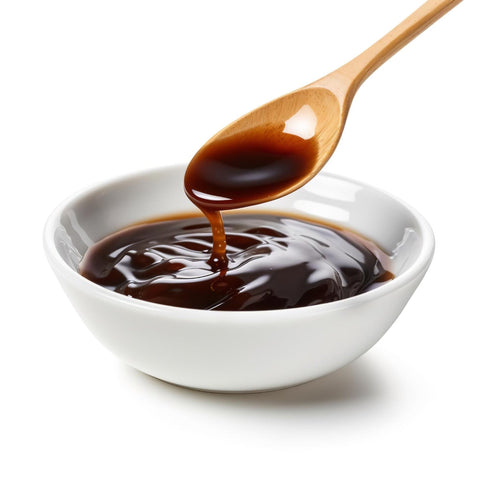More and more people are looking for healthier alternatives to refined sugar. One of these is coconut nectar – a natural sweetener extracted from the flower sap of the coconut palm.
But what really makes it healthier than conventional industrial sugar? Here you'll find the answers – scientifically proven and clearly explained.
What is coconut nectar?
Coconut nectar is extracted from the blossom sap of the coconut palm ( Cocos nucifera ). The sap is gently heated to evaporate water and produce a syrupy nectar. Unlike coconut blossom sugar, coconut nectar does not crystallize but remains liquid and contains many valuable nutrients.

Nutrient profile – More than just sweet
Coconut nectar is not only a sweetener but also provides important micronutrients and bioactive compounds:
-
Minerals : potassium, magnesium, iron, zinc
-
Antioxidants : Polyphenols and flavonoids – protect cells from oxidative stress
-
Amino acids : All nine essential amino acids – important for muscles, cells and the immune system
👉 These ingredients are completely missing in industrial sugar!
Amino acids – the building blocks of life
Coconut nectar contains all nine essential amino acids that our body cannot produce itself.
They are crucial for:
-
muscle building
-
Tissue repair
-
Hormone production
Particularly worth mentioning are: histidine, arginine, cysteine and tyrosine .
Glycemic Index – Gentler effect on blood sugar levels
The glycemic index (GI) measures how quickly a food causes blood sugar levels to rise.
The glycemic index (GI) of coconut nectar is around 35—significantly lower than that of processed sugar (approximately 60–65). Low-GI foods help prevent blood sugar spikes and reduce the risk of type 2 diabetes.
Fructose content – Less strain on the liver
High fructose consumption is associated with various health problems such as fatty liver and insulin resistance.
Coconut nectar contains only about 35–40% fructose —much less than agave syrup (up to 85%). Less fructose means less strain on the liver and a lower risk of fatty liver disease and metabolic problems.
Conclusion – Natural sweetness with added value
✅ Nutrient-rich : Coconut nectar provides minerals and antioxidants.
✅ Low GI : Less strain on blood sugar levels.
✅ Lower fructose content : Less strain on the liver and metabolism.
Coconut nectar is therefore a healthier alternative to industrial sugar – although it should be consumed in moderation, as it still contains sugar.
Our organic coconut nectar from Homegardens in Sri Lanka
Like all our products, our coconut nectar comes from Sri Lanka's home gardens. It is organic and hand-harvested. This special nectar enhances many of our products and is a compelling ingredient for a unique taste experience, not only from a health perspective but also from an indulgent perspective.
Here you can find our products sweetened with the valuable coconut nectar:
Chai syrup (Coming soon 🤫)

Scientific sources
Here you can find the scientific sources on which our statements in this article are based:
-
Kusumawaty et al. (2012)
Coconut sap as a potential source of sugar
To the study › -
Prolifecoco (2017)
The health benefits of using coconut nectar
To the article › -
Sri Lanka Export Development Board (2020)
Coconut SAP-based products
To the article › -
Chinnamma et al. (2019)
The amino acid profile and vitamin content of coconut Neera
To the study › -
Okoma et al. (2020)
Mineral composition of table sugars from coconut sap
Journal of Chemical, Biological and Physical Sciences -
Murlidhar Meghwal (2021)
An Update on Uses, Benefits and Potential Application of Neera
Journal of Nutrition and Food Processing -
James Brown (2025)
Is coconut tree sap healthy?
Treepursuits





